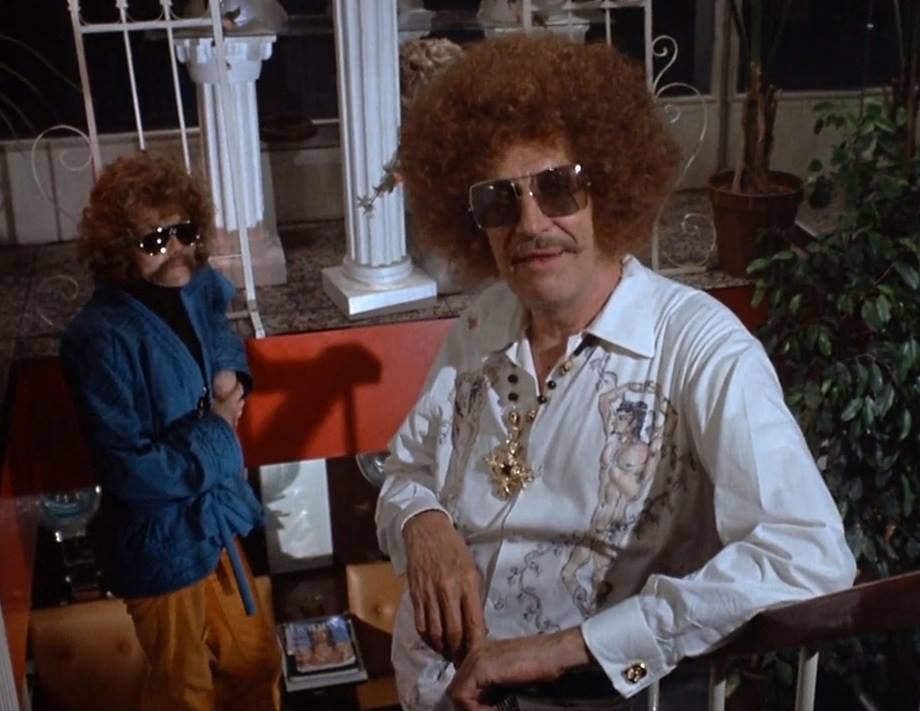No one wrote better murders than Shakespeare. In the course of thirty-eight plays, the Bard managed to stab, poison, hang, burn, drown, blind, and mutilate heroes and villains alike; in Titus Andronicus alone, people are buried alive, bled to death, raped, dismembered, and baked into a pie. Deaths by sword and dagger abound, described in lurid detail; blood flows onto the floorboards, and it’s a miracle if anyone manages to survive a Shakespearean tragedy. Just think about Horatio standing there surrounded by bodies when Fortinbras comes in. The Final Girl never had it so rough.
So the fantastic horror-comedy Theater of Blood takes its cues right from the Bard, telling a bloody story of melodramatic mayhem with a celebrated over-actor at its center. Now available in a shiny new Blu-ray from Kino-Lorber, Theater of Blood critiques the critics and brings Shakespeare’s murders back to the blood-thirsty masses.
Vincent Price is actor Edward Lionheart, who apparently commits suicide following a critical drubbing of his “season of Shakespeare” and the subsequent denial of a Critics’ Circle award in favor of a “grunting, mumbling boy” (a none-too-subtle dig at Marlon Brando). But Lionheart’s death has been exaggerated, and he returns two years later to take a pound of flesh from the critics who eviscerated him. He does this in true Shakespearean fashion, modeling the murders after killings in Shakespeare’s plays. Also under suspicion in the murders is Edwina (Diana Rigg), Lionheart’s daughter. This isn’t a question of whodunnit—we know that within the first five minutes—but of how it will all be done.
While Theater of Blood may feel like a silly romp, with winking references and overwrought performances, it’s far from it. The Shakespeare references go right down to the bone, interacting with the plays in a Grand Guignol style. These are not just the famous murders of Othello or Romeo and Juliet—there’s a decapitation a la Cymbeline, a horse-dragging from Troilus and Cressida, and one of the more infamous scenes from Titus Andronicus, punctuated by Price’s gleeful intonations of speeches and soliloquies to his silent chorus of homeless “mechanicals.” This is where Theater of Blood exceeds itself, where it becomes more than just an entertaining horror—it highlights the fact that Shakespeare, for all the high-flown language, is often a giallo film writ large, a playing to the groundlings in the front row far more than the aristocrats in the stalls.
Lionheart’s claim that the critics didn’t understand or appreciate his work is likely accurate—this is Shakespeare at his most melodramatic and histrionic, and like Lionheart, the film both respects the text and reminds the viewer that a lot of it is quite extreme and silly. It opens with murder scenes from silent film versions of Shakespeare—Merchant of Venice, Othello, Hamlet—highlighting the visually “extreme” acting of performers playing Shakespeare without the language. Yes, Shakespeare did write a play where a woman wakes up to her husband’s headless corpse. Yes, Henri VI Part I glories in the burning of Joan of Arc. It’s gritty and brutal and a bit funny, and it’s all Shakespeare.

Price is on point here, in perhaps his greatest performance in a horror film, giving him the chance to sneer, posture, and consume the scenery whole, without bothering with needless plot development or longer sequences that don’t involve his character. He’s more than ably matched by Diana Rigg, one of the greatest Shakespearean actors of her generation, also having the time of her life in dissecting language and critics. The rest of the cast are a who’s who of fantastic character actors, from Ian Hendry and Coral Browne, to Robert Morley walking a very thin camp line.
Theater of Blood manages to be gleeful without mocking either the characters or Shakespeare himself. Lionheart is the villain, yes, but he’s also deeply sympathetic. The critics might be correct about his performances, but there’s a great joy in seeing them systematically murdered. The Shakespearean intonations don’t begin and end with the murders themselves; the entire film is a mashup of references, beginning with a modern-day version of Caesar’s conversation with his wife on the Ides of March. The critics are not only given deaths modeled after Shakespeare, but are Shakespearean archetypes themselves—the drunkard, the “witch,” the “queen.” You can predict who is going die in what way just on a cursory understanding of their personalities.
While Theater of Blood has been referred to as a spoof on Price’s earlier The Abominable Dr. Phibes, it’s far too varied and conversant with its topic to be considered a parody of a parody. There are abundant references to Price’s career, and the film plays off his elevation as a star of camp horror films. Rigg’s presence likewise contains a sly nod—at the time she was a member of the National Theater Company, and had been a Royal Shakespeare performer since the age of twenty-one. It’s notable too that both Price and Rigg considered the film their favorite.
Theater of Blood is a rare delight. It’s a camp horror film, a dissection of Shakespeare, a diatribe against cruel critics, a wicked adoration of the acting profession. It is brutal and hilarious, dark, violent, and an absolute joy. While Kino’s new Blu-ray is somewhat thin with extras—I’d have paid good money for Rigg to do a commentary before her passing—it’s a lovely restoration and a thrill to have this film available in the US.



